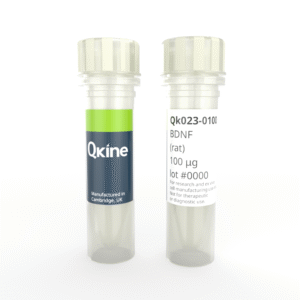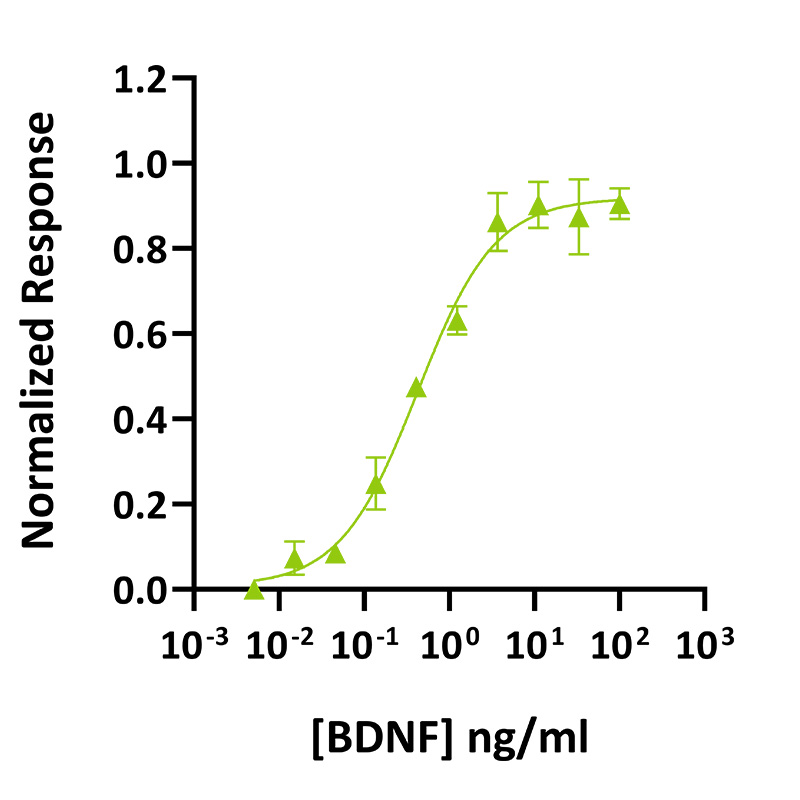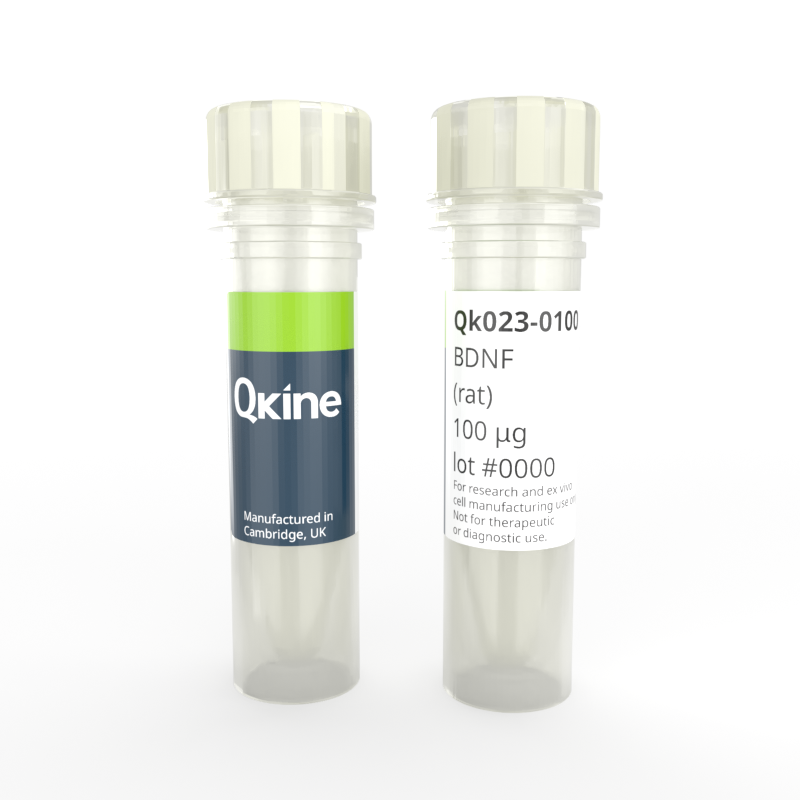 Recombinant rat BDNF protein (Qk023)
Recombinant rat BDNF protein (Qk023)Recombinant rat BDNF protein (Qk023)
Price range: £230.00 through £2,900.00
Brain-derived neurotrophic factor (BDNF) is a member of neurotrophin family and plays a crucial role in neural development, maintenance, and function. It stimulates neurogenesis and is also a major regulator of synaptic plasticity and neuroprotection. It is used to maintain neurons and differentiate mature pluripotent stem cell-derived neural progenitors to cortical and motor neurons and cortical organoids.
Recombinant rat BDNF protein has a molecular weight of 14 kDa. This protein is animal origin-free, carrier-free, tag-free, and non-glycosylated to ensure its purity with exceptional lot-to-lot consistency. Qkine BDNF is suitable for the culture of reproducible and high-quality cortical and motor neurons and cortical organoids.
In stock
Orders are typically shipped same or next day (except Friday).
Easy world-wide ordering, direct or through our distributors.
Price range: £230.00 through £2,900.00
Buy online with secure credit card or purchase order. For any questions, please email orders@qkine.com
Summary:
- High purity human BDNF protein (Uniprot: P23560)
- 14 kDa
>98%, by SDS-PAGE quantitative densitometry
Expressed in E. coli
Animal origin-free (AOF) and carrier protein-free
Manufactured in our Cambridge, UK laboratories
Lyophilized from acetonitrile, TFA
- Resuspend in sterile-filtered water at >50 µg/ml, add carrier protein if desired, prepare single use aliquots and store frozen at -20 °C (short-term) or -80 °C (long-term).
Featured applications:
Differentiation of midbrain dopaminergic neurons
Differentiation of iPSC derived neural progenitors to neurons

Recombinant BDNF activity was determined using a NFAT-luciferase reporter assay in transfected HEK293T cells also expressing TrkB. EC50 = 0.58 ng/ml (41 pM). Cells are treated in triplicate with a serial dilution of BDNF for 6 hours. Firefly luciferase activity is measured and normalized to the control Renilla luciferase activity.
Recombinant BDNF migrates as a single band at 14 kDa in non-reducing (NR) conditions and upon reduction (R). No contaminating protein bands are visible. Purified recombinant protein (3 µg) was resolved using 15% w/v SDS-PAGE in reduced (+β-mercaptothanol, R) and non-reduced (NR) conditions and stained with Coomassie Brilliant Blue R250.

Further quality assays
Mass spectrometry: single species with expected mass
Recovery from stock vial: >95%
Endotoxin: <0.005 EU/μg protein (below level of detection)
We are a company founded and run by scientists to provide a service and support innovation in stem cell biology and regenerative medicine. All our products are exceptionally high purity, with complete characterisation and bioactivity analysis on every lot.
Protein background
Brain-derived neurotrophic factor (BDNF) is a member of neurotrophin family which includes nerve growth factor (NGF) and neurotrophin–3/4/5 (NT–3/4/5) [1,2]. BDNF plays a crucial role during embryonic development and the maintenance of the nervous system during adulthood. It mediates many aspects, including the survival, growth, maintenance, and differentiation of neural stem cells and mature neurons [3,4]. It stimulates neurogenesis and promotes the growth of dendrites and axons [5,6]. It is also involved in synaptic plasticity, forming and strengthening synapses in response to experience and learning [7]. Finally, it regulates the neuroprotection as it is involved in neural repair and recovery [8].
In cell culture, recombinant BDNF supports the survival and growth of neurons and establishes and strengthens synapses. It is used in combination with other growth factors to maintain neurons and to differentiate induced pluripotent stem cell-derived neural progenitors into neurons [5]. It is used for the differentiation and maturation of dopaminergic neurons with glial-derived neurotrophic factor (GDNF), FGF-8a/FGF-8b, and Shh [9–11]. Glutamatergic and GABAergic neurons are maintained with combinations of BDNF, GDNF, NT-3, or insulin-like growth factor 1 (IGF-1) [12–14]. Cholinergic neurons are obtained using BDNF, IGF-1, and NGF [15,16]. Also, the culture of cortical organoids require BDNF and GDNF for maturation [17].
BDNF is released by various cells including neurons, glial cells (astrocytes and microglia), immune cells (T cells and macrophages), as well as skeletal muscles. It has several precursor isoforms and its mature active form is a dimer stabilized by a cysteine knot composed of 119 amino acids and a molecular weight of around 13 kDa [18]. The mature isoform binds to the receptor tropomyosin receptor kinase B (TrkB) with high affinity to activate MAPK, PI3K and PLC-γ signaling cascades [19,20]. These pathways are related to the survival of neurons, growth of dendrites and axons, development of synapses, and learning- and memory-dependent synaptic plasticity19. In addition, this protein binds to p75 neurotrophin receptor (p75NTR) with lower affinity to activate the NF-kB activation [21].
Impaired BDNF signaling has been linked to several diseases such as neurodegenerative diseases such as Alzheimer’s and Parkinson’s diseases, neurological disorders such as depression and anxiety disorders, as well as spinal cord injury [22,23]. Recombinant BDNF and other neurotrophins such as NGF and NT-3 are a growing area of research as potential targets [22,24]. For example, pharmacological agents or gene therapy could increase BDNF production and release which may have therapeutic potential for conditions like amyotrophic lateral sclerosis and depression. Also, targeted delivery of this protein could be beneficial to preserve nerve function, promote healthy brain ageing, and regenerate the loss of neurons.
Rat BDNF has 100% homology to human BDNF (Qk050).
Additional resources
- Animal origin-free BDNF and GDNF neural growth factors for enhanced iPSC-derived neuronal cultures (PDF)
- Maintenance of iNeurons using Qkine animal origin-free BDNF (PDF)
- Differentiation of induced pluripotent stem cells (iPSCs) into dopaminergic neurons (PDF)
- Poster: Neural and glial cell maintenance and differentiation
- Brochure: Growth factors for neural and glial cell differentiation
- Brochure: Growth factors for enhanced organoid culture protocols
Our products are for research use only and not for diagnostic or therapeutic use. Products are not for resale.
For use in manufacturing of cellular or gene therapy products. Not intended for in vivo applications.

Receive an Amazon gift voucher when you leave us a review.
£25, $30 or €30 for reviews with an image and £10, $15 or €15 for reviews without an image
